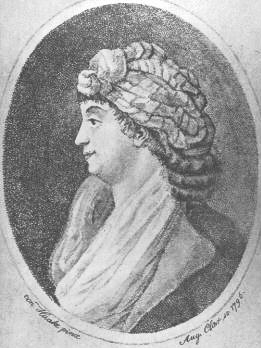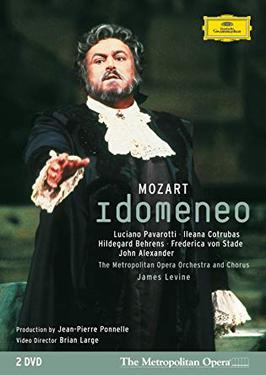Related Research Articles

Don Giovanni is an opera in two acts with music by Wolfgang Amadeus Mozart to an Italian libretto by Lorenzo Da Ponte. Its subject is a centuries-old Spanish legend about a libertine as told by playwright Tirso de Molina in his 1630 play El burlador de Sevilla y convidado de piedra. It is a dramma giocoso blending comedy, melodrama and supernatural elements. It was premiered by the Prague Italian opera at the National Theater, now called the Estates Theatre, on 29 October 1787. Don Giovanni is regarded as one of the greatest operas of all time and has proved a fruitful subject for commentary in its own right; critic Fiona Maddocks has described it as one of Mozart's "trio of masterpieces with librettos by Da Ponte".
In Western classical music, obbligato usually describes a musical line that is in some way indispensable in performance. Its opposite is the marking ad libitum. It can also be used, more specifically, to indicate that a passage of music was to be played exactly as written, or only by the specified instrument, without changes or omissions. The word is borrowed from Italian ; the spelling obligato is not acceptable in British English, but it is often used as an alternative spelling in the US. The word can stand on its own, in English, as a noun, or appear as a modifier in a noun phrase.

Idomeneo, re di Creta ossia Ilia e Idamante is an Italian-language opera seria by Wolfgang Amadeus Mozart. The libretto was adapted by Giambattista Varesco from a French text by Antoine Danchet, based on a 1705 play by Crébillion père, which had been set to music by André Campra as Idoménée in 1712. Mozart and Varesco were commissioned in 1780 by Karl Theodor, Elector of Bavaria for a court carnival. He probably chose the subject, though it may have been Mozart. The work premiered on 29 January 1781 at the Cuvilliés Theatre in Munich, Germany.

Magdalena Kožená, Lady Rattle is a Czech mezzo-soprano.
"Vorrei spiegarvi, oh Dio!" is a soprano aria by Wolfgang Amadeus Mozart.
Vincenzo dal Prato was an Italian soprano castrato singer, famous for his work with Mozart.

"Lascia ch'io pianga", originally "Lascia la spina, cogli la rosa", is an Italian-language soprano aria by composer George Frideric Handel that has become a popular concert piece.
Rondò is a type of operatic vocal solo, popular in the late 18th century. The name identifies both a musical form and the type of materials used.
"Ch'io mi scordi di te? ... Non temer, amato bene", K. 505, is a concert aria by Wolfgang Amadeus Mozart for soprano, piano obbligato and orchestra, composed in December 1786 in Vienna. It is often considered to be one of his greatest compositions in this genre.

Demofoonte is an opera in three acts by the Czech composer Josef Mysliveček. It was the composer's first setting of this popular libretto by Metastasio first produced in 1733. This setting stays remarkably close to the original drama for its day, but the role of Timante was augmented in order to highlight the talents of its interpreter, the distinguished male soprano Gaetano Guadagni. All of Mysliveček's operas are of the serious type in Italian referred to as opera seria.

La Nitteti is an 18th-century Italian opera in 3 acts by the Czech composer Josef Mysliveček. It was composed to a libretto by the Italian poet Metastasio that was first performed in 1756, one of the newer of the Metastasian librettos in Mysliveček's day. For a performance in the 1770s, it would only be expected that a libretto of such age would be abbreviated and altered to suit contemporary operatic taste. This opera contains more substitutions of original aria texts than any other Mysliveček setting of a Metastasian libretto. The cuts and changes in the text made for the 1770 performance of Mysliveček's opera are not attributable. All of Mysliveček's operas are of the serious type in Italian language referred to as opera seria.
"Sombre forêt" is a soprano aria from act two of the opera William Tell by Gioachino Rossini, to a French libretto by Étienne de Jouy and Hippolyte Bis. It is sung by Mathilde, a princess of the House of Habsburg, as she waits in the forest on the heights of Rütli for her Swiss lover, Arnold Melchthal.
"Popoli di Tessaglia! – Io non chiedo, eterni Dei" (K. 316/300b) is a recitative and aria for soprano and orchestra that Wolfgang Amadeus Mozart wrote for Aloysia Weber. It is famous for including two occurrences of a G6, i.e. the G above high C, or 1568 Hz by modern concert pitch – according to the Guinness Book of Records, the highest musical note ever scored for the human voice. (However, an A6 is scored in Ignaz Umlauf's Das Irrlicht, also sung by Aloysia Weber.)

"Ah! perfido", Op. 65, is a concert aria for soprano and orchestra by Ludwig van Beethoven. The dramatic scena begins with a recitative in C major, taken from Pietro Metastasio's Achille in Sciro. The aria "Per pietà, non dirmi addio" is set in the key of E-flat major, and its lyricist is anonymous. A performance takes about 14 minutes.

Idomeneo is a 181-minute television film of the Metropolitan Opera's first staging of Wolfgang Amadeus Mozart's 1781 opera Idomeneo, re di Creta ossia Ilia e Idamante, produced by Jean-Pierre Ponnelle and performed by a cast headed by John Alexander, Hildegard Behrens, Ileana Cotrubaș, Luciano Pavarotti and Frederica von Stade under the direction of James Levine. It was recorded live on 6 November 1982, and telecast live in the United States by the Public Broadcasting Service series Live from the Metropolitan Opera. It has been released on VHS video cassette, Laserdisc and DVD.
"Bella mia fiamma, addio", K. 528, is a concert aria by Wolfgang Amadeus Mozart for solo soprano and orchestra, composed in Prague in 1787. The text of this aria is taken from the 1772 opera Cerere placata, composed by Niccolò Jommelli with text by Michele Sarcone. The aria was published by Breitkopf & Härtel in 1881.
"Ah, lo previdi!” – “Ah, t’invola” – – “Misera!” – “Deh, non varcar", K. 272, is a concert aria by Wolfgang Amadeus Mozart for solo soprano and orchestra, one of Mozart's first large-scale operatic concert pieces.
"Voi avete un cor fedele", K. 217, is a concert aria by Wolfgang Amadeus Mozart for solo soprano and orchestra, composed in Salzburg, dated 26 October 1775. Written around the time of the composition of Mozart's five violin concertos. In this aria, the character Dorina contemplates a new romantic partner.
References
- ↑ "Non più tutto ascoltai...Non temer, amato bene". MusicBrainz . Retrieved April 5, 2021.
- ↑ "Non più, tutto ascoltai... Non temer, amato bene, K 490". l'Ochrestra Virtuale del Flaminio (in Italian). Retrieved April 5, 2021.
- ↑ "Non più. Tutto ascoltai, tutto compresi". The Liedernet Archive. Retrieved April 5, 2021.
- ↑ H. C. Robbins Landon, Mozart: The Golden Years, New York: Schirmer, 1989, pp. 183–184 ISBN 0028720253.
- ↑ The New Grove Mozart (1980) Stanley Sadie, p. 76 ISBN 0333341996